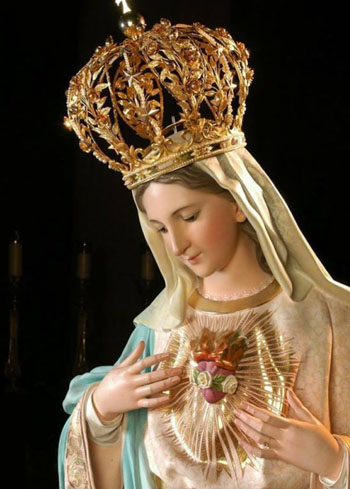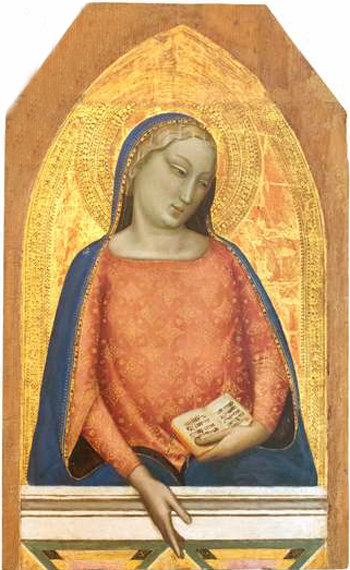 |
Feast Days of Our Lady
Memorial of The
Wise & Immaculate Heart of Mary
June 12
Prof. Plinio Corrêa de Oliveira
You can note that we add the adjective “wise” to the expression Immaculate Heart of Mary: It is the Wise and Immaculate Heart of Mary. What is the reason for this addition? Why do we speak of Wise Heart of Mary?

The Immaculate Heart of Mary
raises her above all bad impulses |
There has been so much said about the Immaculate Heart of Mary that I will say only a brief word on it.
Our Lady, as you know, was conceived without Original Sin, and her Heart – which is the symbol of her soul, her sanctity, the cogitations of her mind – is Immaculate because she is Immaculate. Everything that comes from an immaculate person is without stain.
When we say that her Heart is Immaculate, we are pointing to the abyssal difference between her and us. We are conceived with Original Sin and, for this reason, no matter how much we ascend in spiritual life, we always have bad impulses. Even if we were able to combat these impulses and conquer them, they would be always present.
With Our Lady this did not happen. In her no impulse was bad; all her impulses were conformed to reason and all the movements of her reason were inspired by grace. Thus, in her everything was harmonic, perfect and turned toward good. When we speak of the Immaculate Heart of Mary we want to express this fact: She had such great purity that she did not have the least penchant or inclination toward evil regarding chastity or any other virtue.
The virtue of wisdom
What is the wisdom of the Heart of Mary? Evidently a Wise Heart is full of wisdom. What does it mean to say that the Immaculate Heart of Mary is a Wise Heart?
The virtue of wisdom makes us see things from their more elevated aspects and, for this reason, makes us see in things a marvelous unity. Since the world is organized in the form of a pyramid, the more we analyze the universe from its elevated aspects, the more our considerations unite until they reach an ultimate point, which is the Absolute Being.
This ultimate point is a reflection about God, the infinite, perfect and eternal Being, who can never have an end or suffer any alteration, who is perfect in Himself and needs no other; and who is the Creator, Model and End of everything.

The virtue of Wisdom allows man
to find the divine in all things |
The consideration of things from their Deiform aspect, that is, how they represent and serve God is a consideration that leads the mind to an admirable unity and an extraordinary coherence without any contradiction, laceration or hesitation. Instead, the soul moves forward with certainty, faith, conviction and firmness that flow from the first elevated principles and touches upon even the most minor things.
This is the moral physiognomy of the truly Catholic man: He is coherent in everything he does because everything in him is a result of the loftiest thoughts, that is, a thinking that is anchored in God Our Lord.
Wisdom as a virtue of the intelligence is this. And as a virtue of the will, it is the firm disposition to follow the intelligence in what it knows and shows us. Therefore, it is to unshakably and firmly do what is our duty.
Thus, a wise soul is formed by a regally limpid, lucid and coherent understanding because it is grounded on the conviction of the existence of God and filled with the supernatural; to this is added a strong, firm and unshakable will constantly turned toward its End and the hierarchy crowned by this End. This is what a wise man is.
The wisdom of the Heart of Mary
This virtue of wisdom contains all the virtues; it is the virtue that corresponds to the First Commandment. When the Decalogue tells us “Thou shalt love the Lord thy God with all thy heart, all thy soul and all thy understanding, etc” this Commandment instructs us to be wise. Our Lady followed this Commandment perfectly.
Her Heart, that is, her soul, her mind, was regally elevated, serious, grand and profound because she was wise. She was the Vessel of Election upon whom the Holy Spirit descended to make a chaste marriage with her and generate Our Lord.
One of the few references in the Gospel to Our Lady is
The Magnificat, which is a true marvel of wisdom.
Magnificat: Example of a counter-revolutionary prayer
On another occasion I made an analysis of the Magnificat and it is not the case to repeat it here. However, I would like to show the wisdom contained in that first word – Magnificat. Magnificat means to exalt, to magnify, to aggrandize. Magnificat anima mea Dominum means “my soul doth magnify the Lord” or in other words: “My soul is enraptured with the grandeur of My Lord, it adores My Lord in His perfect and unfathomable greatness and it offers an extrinsic addition to this grandeur by singing of His greatness.”
You see that the word she uses to initiate her canticle is a praise of grandeur, of greatness; it is a canticle of the noblest of souls that soars upward to consider God in His highest aspects. Then, in a marvelous contrast, she returns to consider her own nothingness.

Our Lady of the Magnificat, 14th century |
“Because He has considered the humility of His Slave, all generations will call me Blessed.” You see the beauty of her position. Through wisdom, she measured all the grandeur of God and was delighted with it.
On the other hand, she measured her smallness and said: “I exult in God my Savior for He has deigned to look at the smallness of His Slave.” It is a Counter-Revolutionary poem! It is the slave who rejoices in being small and in seeing how God is superior to her, infinitely superior to her. From the depths of her nothingness, she glorifies God.
You see here the small one who recognizes her smallness and is delighted with being small. She does not revolt, she does not become indignant. Instead, she places herself in the last place. Nothing is less than a slave; a slave has no rights; he is below the normal condition of men.
Well, here Our Lady proclaims herself the Slave of the Lord Our God. She is the precursor of all the slaves that she would have throughout the centuries. She exulted in her smallness and in His greatness; and in His greatness He loved her smallness.
You see how this is the opposite of the spirit of the French Revolution, of Communism. It is so opposed that is almost irreverent to make a comparison. She is truly humble, she loves the smallness of her place, but she adores the greatness of God. Thus does she elevate herself with that greatness of God, even though she is not the owner of that greatness. To the contrary, she proclaims that the greatness owns her.
On the Memorial of the Immaculate Heart we should ask Our Lady to make us as pure as she is and as wise as she is. We should ask her to help us to love our smallness and to take seriously – to its final consequences – our condition as her slaves.
On the other hand, we should keep in mind her greatness and all greatnesses that are not ours, so that she may turn toward us and enchant us with that loving relationship which exists between the greatness of one who regards the smallness of another.
This is a meditation for the eve of the Memorial of the Wise and Immaculate Heart of Mary.


  |
Prof. Plinio Corrêa de Oliveira
| |
The Saint of the Day features highlights from the lives of saints based on comments made by the late Prof. Plinio Corrêa de Oliveira. Following the example of St. John Bosco who used to make similar talks for the boys of his College, each evening it was Prof. Plinioʼs custom to make a short commentary on the lives of the next dayʼs saint in a meeting for youth in order to encourage them in the practice of virtue and love for the Catholic Church. TIA thought that its readers could profit from these valuable commentaries.
The texts of both the biographical data and the comments come from personal notes taken by Atila S. Guimarães from 1964 to 1995. Given the fact that the source is a personal notebook, it is possible that at times the biographic notes transcribed here will not rigorously follow the original text read by Prof. Plinio. The commentaries have also been adapted and translated for TIAʼs site.
|
Saint of the Day | Home | Books | CDs | Search | Contact Us | Donate

© 2002- Tradition in Action, Inc. All Rights Reserved
|
 |

|